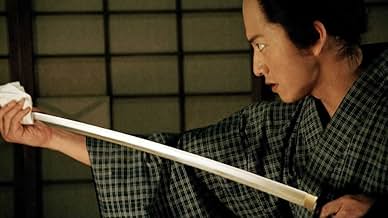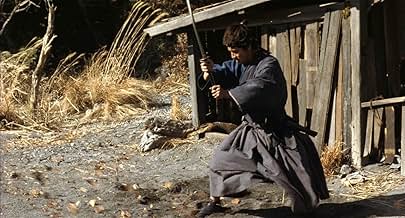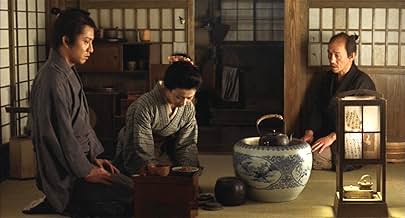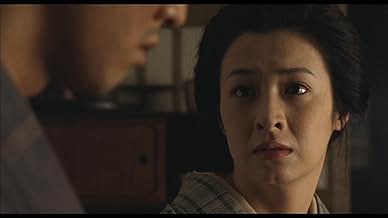CALIFICACIÓN DE IMDb
7.7/10
4.5 k
TU CALIFICACIÓN
Agrega una trama en tu idiomaA look at the relationship between a young blind samurai (Kimura) and his wife, who will make a sacrifice in order to defend her husband's honor.A look at the relationship between a young blind samurai (Kimura) and his wife, who will make a sacrifice in order to defend her husband's honor.A look at the relationship between a young blind samurai (Kimura) and his wife, who will make a sacrifice in order to defend her husband's honor.
- Dirección
- Guionistas
- Elenco
- Premios
- 15 premios ganados y 16 nominaciones en total
Z. Charles Bolton
- Man B
- (English version)
- (voz)
Duncan Brannan
- Hori
- (English version)
- (voz)
- …
Cole Brown
- Sensei
- (English version)
- (voz)
Chris Burnett
- Shinsuke
- (English version)
- (voz)
Colleen Clinkenbeard
- Kayo Mimura
- (English version)
- (voz)
Opiniones destacadas
A low-ranking samurai, jaded with his dull daily routine, finds himself tested to the core when his food-tasting assignment leaves him blind.
Yoji Yamada's project exploring samurai in transition expands, having had an outing in Twilight Samurai. That movie had Hiroyuki Sanada in the starring role, and the constantly under-achieving Takuya Kimura was always going to be a hard sell in this role for some. However, he stands up competently here. Shinnojo wakens blind and immediately becomes suicidal. He is granted a healthy stipend of rice from the authorities, and the slow dawning of its true price inexorably works on Shinnojo, eventually becoming too much to bear. This delicately paced transition is plotted by Kimura's expressions, from self-loathing to acceptance to vengeful warrior, with loving husband always present.
Kaori Momoi parades her usual quirky genius, but Rei Dan as loving, loyal wife Kayo is the stand-out performance here. Kayo's burden proves equal to her husband's, and Dan earns our sympathy as the compromised spouse.
The film doesn't quite achieve the delicacy and pathos of Twilight Samurai, but it does add another dimension to the humanistic portrayal of the samurai that is Yamada's trope. For that reason alone, Love and Honour is worth checking out.
Yoji Yamada's project exploring samurai in transition expands, having had an outing in Twilight Samurai. That movie had Hiroyuki Sanada in the starring role, and the constantly under-achieving Takuya Kimura was always going to be a hard sell in this role for some. However, he stands up competently here. Shinnojo wakens blind and immediately becomes suicidal. He is granted a healthy stipend of rice from the authorities, and the slow dawning of its true price inexorably works on Shinnojo, eventually becoming too much to bear. This delicately paced transition is plotted by Kimura's expressions, from self-loathing to acceptance to vengeful warrior, with loving husband always present.
Kaori Momoi parades her usual quirky genius, but Rei Dan as loving, loyal wife Kayo is the stand-out performance here. Kayo's burden proves equal to her husband's, and Dan earns our sympathy as the compromised spouse.
The film doesn't quite achieve the delicacy and pathos of Twilight Samurai, but it does add another dimension to the humanistic portrayal of the samurai that is Yamada's trope. For that reason alone, Love and Honour is worth checking out.
Others have commented on the story so I will skip the synopsis.
The story is about human drama, and the unusual talent the main character has that leads to bombastic climax. This is typical Shuhei Fujisawa's style, and this story is no exception.
What took away from the story compared to other Shuhei Fujisawa based movie is the poor acting by Takuya Kimura. His impatient and jittery personality shows in his acting, and the poor ways he speaks the dialog all takes away from the proper mood of the story. As the member of SMAP - a Japanese idol group, his acting DNA was bread for more modern situation, and probably isn't a good match for a period drama like this one. I couldn't get the feeling that this was a samurai living several hundred years ago. His poor dialog skill also was evident in more recent movie Uchuu Senkan Yamato as well. Another period piece starring his SMAP colleague Shingo Katori's "Zatoichi The Final" was also a flop, attesting to the mismatch of SMAP member with samurai movies.
So the main focus was weak, but the movie still has quality all its own. The sword fight scene was superb like other Fujisawa novel based movies. As a samurai movie, this is still one of the best in recent years, and is recommended along with other Shuhei Fujisawa movies such as Hisshiken Torizashi, and Hana no Ato.
The story is about human drama, and the unusual talent the main character has that leads to bombastic climax. This is typical Shuhei Fujisawa's style, and this story is no exception.
What took away from the story compared to other Shuhei Fujisawa based movie is the poor acting by Takuya Kimura. His impatient and jittery personality shows in his acting, and the poor ways he speaks the dialog all takes away from the proper mood of the story. As the member of SMAP - a Japanese idol group, his acting DNA was bread for more modern situation, and probably isn't a good match for a period drama like this one. I couldn't get the feeling that this was a samurai living several hundred years ago. His poor dialog skill also was evident in more recent movie Uchuu Senkan Yamato as well. Another period piece starring his SMAP colleague Shingo Katori's "Zatoichi The Final" was also a flop, attesting to the mismatch of SMAP member with samurai movies.
So the main focus was weak, but the movie still has quality all its own. The sword fight scene was superb like other Fujisawa novel based movies. As a samurai movie, this is still one of the best in recent years, and is recommended along with other Shuhei Fujisawa movies such as Hisshiken Torizashi, and Hana no Ato.
Both the setting of the theme and the creation of the emotional atmosphere tend to make the film more romantic. And exquisite detail guarantees the reliability that a drama about ancient Japan should have. Although the film mainly focuses on the daily life of a samurai, the director Yôji Yamada still gave a little bit of chivalric romance to the ending. However, there is no coexistence between the everyday life and the spirit of a samurai.
Therefore, the protagonist's choice finally writes a summary for this passing era.
A young samurai, married to a beautiful woman, accidentally becomes blind for life. This is the intimate story of what happens to this couple in mid-nineteenth-century Japan. Finding personal honor, love for oneself and for the woman one loves, finding a purpose for living. Director Yamada tells us this with an increasingly engaging and intimate narrative style. In my opinion very refined in the feelings it wants to convey, accurate in the scenic reconstructions of daily life of the time. Worth seeing if you liked, also by Yamada, Twilight of the Samurai (2002) even if it does not reach the depths of story, feelings and direction.
I love the Zatoichi films and have seen all but the very latest rebooting of the series ("Zatoichi the Last"--which is not available yet in the US). So it's obvious that I am a fan of the movies. However, I will also be the first to admit that they are completely ridiculous. After all, a completely blind swordsman who is able to take on dozens of opponents in each film and win is completely impossible...at least on this planet! Because of this, it's great to see "Love and Honor"--a Japanese film with a blind swordsman that is actually believable!!
The film begins with Shinnojo Mimura working for his lord as a food taster. One day, the unthinkable happens and Shinnojo is poisoned. While this ends up saving his master's life, it also ends up nearly killing Shinnojo and leaving him blind! And, as sometimes occurs in the tough feudal society, Shinnojo is left without a purpose and the prospect of losing his income. Some thanks for service to his master, huh?! However, uncharacteristic of many samurai films, soon Shinnojo learns that his master has not forgotten him and will keep giving him his original salary. So how does this end up resulting in Shinnojo fighting someone even though he's blind?! Well, I don't want to ruin the story--just watch this one.
The film has many, many strengths. It is a wonderful story, has a very thrilling conclusion and a touching love story--albeit an odd one! Well performed all around and one of the better samurai films I have seen--and I have seen quite a few. Well worth your time.
The film begins with Shinnojo Mimura working for his lord as a food taster. One day, the unthinkable happens and Shinnojo is poisoned. While this ends up saving his master's life, it also ends up nearly killing Shinnojo and leaving him blind! And, as sometimes occurs in the tough feudal society, Shinnojo is left without a purpose and the prospect of losing his income. Some thanks for service to his master, huh?! However, uncharacteristic of many samurai films, soon Shinnojo learns that his master has not forgotten him and will keep giving him his original salary. So how does this end up resulting in Shinnojo fighting someone even though he's blind?! Well, I don't want to ruin the story--just watch this one.
The film has many, many strengths. It is a wonderful story, has a very thrilling conclusion and a touching love story--albeit an odd one! Well performed all around and one of the better samurai films I have seen--and I have seen quite a few. Well worth your time.
¿Sabías que…?
- TriviaIn the film it is mentioned repeatedly that the main character of Shinnojo Miura receives a yearly stipend of 30 koku. During the Edo period of Japan a koku was a unit of measure that had the equivalent of one year's worth of rice for a person (approx. 150 kg). For a samurai 30 koku was a small salary and Shinnojo was thus of a low level. Incidentally, the title character from another of Yôji Yamada's films El ocaso del samurái (2002) also receives a 30 koku stipend after having 20 koku deducted from his 50 koku salary to pay for his recently deceased wife's funeral.
- ErroresIt is not stated why, when blinded, he could not continue with his food tasting role, for which sight is not required.
- Citas
Shinnojo Mimura: Be resolved you will both die. In that lies victory. Life lies in resolve for death.
- ConexionesFollows El ocaso del samurái (2002)
Selecciones populares
Inicia sesión para calificar y agrega a la lista de videos para obtener recomendaciones personalizadas
- How long is Love and Honor?Con tecnología de Alexa
Detalles
- Fecha de lanzamiento
- País de origen
- Sitio oficial
- Idioma
- También se conoce como
- Love and Honor
- Locaciones de filmación
- Productoras
- Ver más créditos de la compañía en IMDbPro
Taquilla
- Total en EE. UU. y Canadá
- USD 60,910
- Fin de semana de estreno en EE. UU. y Canadá
- USD 5,234
- 4 may 2008
- Total a nivel mundial
- USD 33,755,574
- Tiempo de ejecución
- 2h 2min(122 min)
- Color
- Mezcla de sonido
- Relación de aspecto
- 1.85 : 1
Contribuir a esta página
Sugiere una edición o agrega el contenido que falta


























